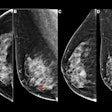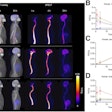A complete, live, infectious sample of the Middle East respiratory syndrome (MERS) coronavirus has been extracted from two camels in Saudi Arabia.
Researchers from the Center for Infection and Immunity at Columbia University's Mailman School of Public Health, King Saud University, and EcoHealth Alliance successfully extracted the virus, which matched the MERS coronavirus (MERS-CoV) found in humans. This indicates that the virus in camels is capable of infecting humans, and that camels are a likely source of the outbreak.
The new article, published online in mBio, builds on a previous report that suggests three-quarters of camels in Saudi Arabia carry the MERS virus.
Nasal samples were collected during a countrywide survey of dromedary camels, and the researchers selected samples from two animals with the highest viral load. They cultured and obtained complete genomic sequences from both animals, as well as virus in nasal samples from several other camels.
The mathematical means of all genetic sequences (the consensus genomic sequences) were consistent with viruses found in humans; however, samples from camels contained more than one virus genotype. Over 48 hours of culture in primate cells, the genomic variation of viruses narrowed, mirroring the lower sequence diversity reported in MERS-CoV found in humans.
"The finding of infectious virus strengthens the argument that dromedary camels are reservoirs for MERS-CoV," said first author Thomas Briese, PhD, associate director of the Center for Infection and Immunity and associate professor of epidemiology at the Mailman School. "The narrow range of MERS viruses in humans and a very broad range in camels may explain in part the why human disease is uncommon: because only a few genotypes are capable of cross-species transmission."
"Given these new data, we are now investigating potential routes for human infection through exposure to camel milk or meat products," added co-author Abdulaziz Alagaili, PhD, director of the Mammals Research Chair at King Saud University.



















